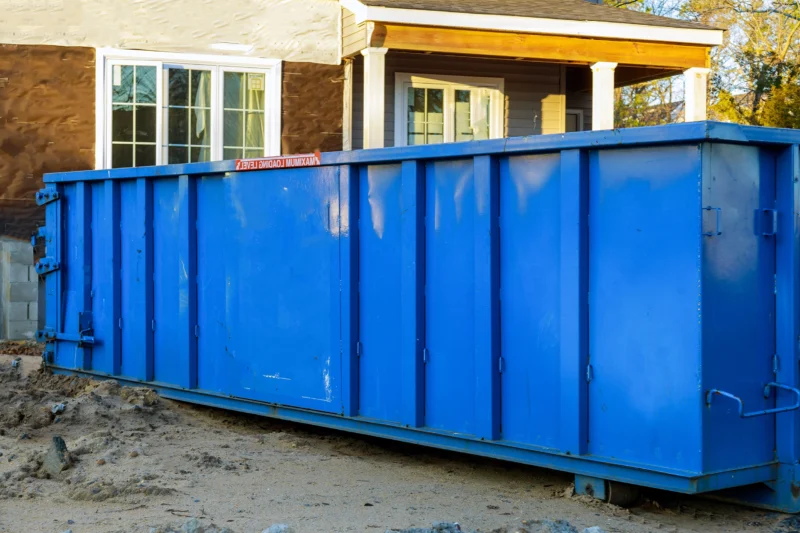Backyard activities produce tons of waste that come in different forms. Activities like construction, roof renovation, gardening works, landscaping, yard cleanup, and general lawn cleaning all produce waste that only a roll-off container can handle.
While we all agree that a waste container is a necessity for back lawn activities, choosing the right size can sometimes be a little challenging.
To know the most appropriate size for your garden waste, we must first look at the different types of waste to expect from back lawns. This is because the type and amount of waste greatly determine the size of the waste bin you will need.

Dumpster rental for backyard cleanout
What Type of Waste Does a Backyard Produce?
Construction Junk
Construction debris is the common type of waste that a back lawn produces. It could be in the form of concrete from driveway construction and renovations. It could also include shingles and framing wood, drywall, and tiles from construction and renovation works in the house.
Green Matter
Green matter refers to all waste that can be composted. These include branches, twigs, tree stumps, shrubs, grass clippings, and weeds. In most cases, you can toss green matter waste into compost where it is turned into organic fertilizer for gardens. However, some state and federal regulations do not allow composting in some neighborhoods. This is where roll-off bins come in handy, to carry green waste.
Soils and Earth
When doing yard activities such as weeding, landscaping, and gardening, soil and dirt are common waste. A rental junk bin is necessary if you have such projects since soil and dirt cannot be thrown just anywhere.
Fencing Waste
Fencing works produce waste in the form of leftover wood and posts, barbed wire, soils, and dirt. The best way to get rid of these is to have a roll-off bin on standby. Most, if not all waste management companies allow fencing waste into their containers.
General Waste
Garden waste is not the only type of junk you can expect to find in a back lawn junk bin. A back lawn junk container can also be used for general waste disposal purposes. General waste items like old furniture, excluding recliners and upholstery, and old appliances like TVs, air conditioners, and stoves are some of the other types of waste you can expect to go into a backspace container.
The Most Appropriate Roll-off Container for Garden Works
10 Yard Bin
A 10-yard container is suitable for yard waste and some minor construction works like kitchen, bathroom, and roof renovation. It measures 8 feet by 12 feet by 3.5 feet. It is the smallest size waste bin available in most garbage companies. The good thing about this dumpster is that you do not have to have so much space to place it.
12 Yard Bin
If you have some quite heavier construction work like tearing down an old house, you will be producing a little heavier and bulkier debris. Bearing in mind that yard waste will also be going into the bin, you will need a much bigger container. A 12-yard container is appropriate for such works.
Factors That Advised the Choice of These Two Size Containers
Amount of Waste
The amount of waste is the main factor that determines the size of the waste bin for your lawn work. The smaller a waste bin, the smaller the volume of waste it can carry, and vice versa. You can determine the volume of waste your backyard will produce when planning for the project.
Placement Location
When choosing your size waste bin, you have to consider the space for placing the container. The bigger the bin, the larger the placement location you will require. Apart from having ample space for the container, the location must also be accessible with a lot of ease. Ensure no obstacles that could hinder easy access for delivery and pickup of the junk bin.
Budget Size
When choosing your backyard waste container, the size of your budget is a major contributing factor. The larger a waste container is, the more the operation rates.
Even with the above guidelines on how to choose a waste bin for backyard waste, some people might still find it a little confusing and hard. In this case, it is always wise to consult with your provider. Consulting helps you to avoid trouble with local regulations and being overcharged. This is because very small containers may lead to overhanging of waste, something that may put you in serious trouble with traffic officers. A good company should advise you accordingly on this prior to renting.

